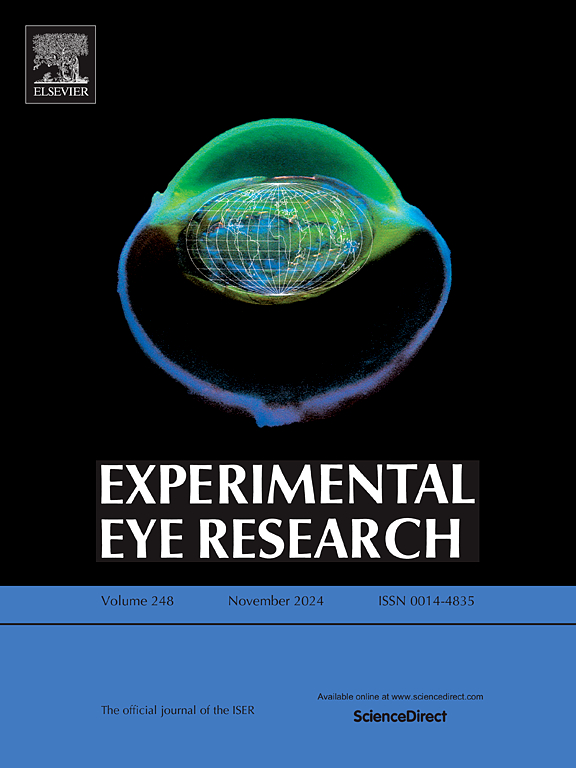Paquinimod attenuates retinal injuries by suppressing the S100A9/TLR4 signaling in an experimental model of diabetic retinopathy
IF 3
2区 医学
Q1 OPHTHALMOLOGY
引用次数: 0
Abstract
Diabetic retinopathy (DR), the most common ocular complication of diabetes mellitus (DM), has exhibited an increase in incidence over the past decade. S100 calcium-binding protein A9 (S100A9) plays a significant role in inflammation and cancer. Toll-like receptor 4 (TLR4), a transmembrane receptor, initiates signaling cascades upon ligand binding. S100A9 activates TLR4, and their involvement in various diseases is well-established. We found elevated S100A9/TLR4 pathway proteins in the vitreous of DR patients. Bioinformatics analysis revealed differential gene expression related to this pathway. These proteins were also detected in diabetic rat retinas and induced structural damage. Paquinimod, an S100A9 inhibitor, decreased pathway protein expression and reduced retinal damage. Our study validates the S100A9/TLR4 pathway in diabetic retinas and suggests its potential as a therapeutic target for DR. Targeting S100A9 could offer a novel approach to prevention and treatment.
在糖尿病视网膜病变的实验模型中,帕喹莫德通过抑制S100A9/TLR4信号传导减轻视网膜损伤。
糖尿病视网膜病变(DR)是糖尿病(DM)最常见的眼部并发症,在过去十年中发病率呈上升趋势。S100 钙结合蛋白 A9(S100A9)在炎症和癌症中发挥着重要作用。Toll 样受体 4(TLR4)是一种跨膜受体,与配体结合后可启动信号级联。S100A9 可激活 TLR4,它们与各种疾病的关系已得到证实。我们发现 DR 患者玻璃体内的 S100A9/TLR4 通路蛋白升高。生物信息学分析揭示了与该通路相关的不同基因表达。在糖尿病大鼠视网膜中也检测到了这些蛋白,并诱发了结构性损伤。S100A9抑制剂Paquinimod可减少通路蛋白的表达,减轻视网膜损伤。我们的研究验证了糖尿病视网膜中的S100A9/TLR4通路,并提示其作为DR治疗靶点的潜力。靶向 S100A9 可为预防和治疗提供一种新方法。
本文章由计算机程序翻译,如有差异,请以英文原文为准。
求助全文
约1分钟内获得全文
求助全文
来源期刊

Experimental eye research
医学-眼科学
CiteScore
6.80
自引率
5.90%
发文量
323
审稿时长
66 days
期刊介绍:
The primary goal of Experimental Eye Research is to publish original research papers on all aspects of experimental biology of the eye and ocular tissues that seek to define the mechanisms of normal function and/or disease. Studies of ocular tissues that encompass the disciplines of cell biology, developmental biology, genetics, molecular biology, physiology, biochemistry, biophysics, immunology or microbiology are most welcomed. Manuscripts that are purely clinical or in a surgical area of ophthalmology are not appropriate for submission to Experimental Eye Research and if received will be returned without review.
 求助内容:
求助内容: 应助结果提醒方式:
应助结果提醒方式:


